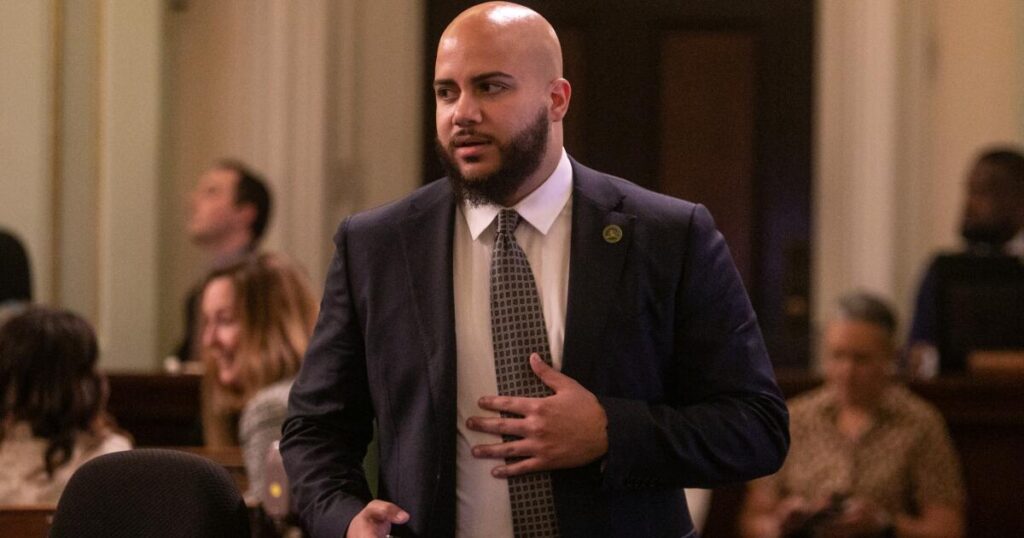SACRAMENTO — Gov. Gavin Newsom on Monday vetoed legislation that would have allowed public and private colleges to provide preferential admissions to applicants directly descended from individuals who were enslaved in the United States before 1900.
The governor thanked the bill’s author for his commitment to addressing disparities and urged educational institutions to review and determine “how, when, and if this type of preference can be adopted.”
“This bill clarifies, to the extent permitted by federal law, that California public and private postsecondary educational institutions may consider providing a preference in admissions to an applicant who is a descendant of slavery,” Newsom wrote Monday in his veto. “These institutions already have the authority to determine whether to provide admissions preferences like this one, and accordingly, this bill is unnecessary.”
The legislation would not have required applicants to belong to any particular race or ethnicity — a crucial detail that proponents said distinguished it from affirmative action, which is banned at California colleges. Critics, however, argued the term “slave” was used as a proxy for race.
Legal experts told The Times last month the measure probably would have faced challenges in court if the governor signed it into law.
“The question with this sort of provision is does this count as on the basis of race?” said Ralph Richard Banks, professor at Stanford Law School and the founder and faculty director of the Stanford Center for Racial Justice. “A secondary issue is going to be whether, even if it is not formally about racial classification, was it really adopted to get around the no-racial-classification rule? The law prohibits indirect methods of doing something that would be prohibited if you were to do it directly.”
Race-based college admissions are banned by federal and state law.
Proposition 209, which California voters approved nearly three decades ago, amended the state Constitution to bar colleges from considering race, sex, national origin or ethnicity during admissions. The U.S. Supreme Court in 2023 in effect ended race-conscious college admissions nationwide, ruling in Students for Fair Admissions vs. Harvard that such policies violate the equal protection clause of the 14th Amendment.
California became the first state government in the country to study reparations, efforts to remedy the lingering effects of slavery and systemic racism, after the 2020 killing of George Floyd by a Minneapolis police officer sparked a national conversation on racial justice.
Newsom and state lawmakers passed a law to create a “first in the nation” task force to study and propose effective ways to help atone for the legacy of slavery. That panel spent years working on a 1,080-page report on the effects of slavery and the discriminatory policies sanctioned by the government after slavery was abolished, and the findings became the genesis for a slate of legislation proposed by the California Legislative Black Caucus.
Last week, Newsom signed Senate Bill 518, which will create a new office called the Bureau for Descendants of American Slavery. That bureau will create a process to determine whether someone is the descendant of a slave and to certify someone’s claim to help them access benefits.
Assemblymember Isaac Bryan (D-Los Angeles), who introduced Assembly Bill 7, said his legislation would have allowed colleges to grant preference to the descendants of enslaved people in order to rectify a “legacy of exclusion, of harm.”
Andrew Quinio, an attorney specializing in equality issues for the Pacific Legal Foundation, believes AB 7 was blatantly unconstitutional. The foundation is a conservative public interest law firm that seeks to prevent government overreach.
“This was a bill that was born out of the Reparations Task Force recommendations; it was part of the package of bills of the Road to Repair from the California Legislative Black Caucus so this has a very clear racial intent and racial purpose and it will have a racial effect,” he said. “[Legislation] doesn’t have to benefit the entirety or even the majority of a demographic in order for it to be unlawfully based on race.”
Lisa Holder, a civil rights attorney and president of the Equal Justice Society, a progressive nonprofit that works to protect policies that promote diversity, argued the measure’s framing made it highly likely to satisfy legal challenges.
“This (legislation) is very specifically tailored to correct the harms that we have seen, the harms from the past that continue into the present,” she said. “… Because this bill seeks to erase those harms by focusing specifically on the descendant community, it is strong enough to establish a compelling interest.”
Gary Orfield, a law and education professor and co-founder of the Civil Rights Project/Proyecto Derechos Civiles at UCLA, agreed the legislation was carefully written in a way that could have withstood legal challenges. He pointed out California allows university programs that support Native American students because they were narrowly tailored to focus on tribal affiliation — which is considered a political classification — instead of race or ethnicity.
Orfield said applicants of various races could have potentially benefited from the new admissions policy, as many Native Americans were enslaved and Asiatic coolieism, or Asian indentured servitude, was declared a form of human slavery in the state constitution in 1879.
“All Black people weren’t slaves and all slaves were not Black,” he said. “I think there is a good argument to say that slavery isn’t defined strictly by race and is not just a proxy for race and there certainly is a legitimate concern when you are thinking about remediation for historic violations.”
Orfield, however, said convincing the public was a different matter.
“I don’t think all people will easily understand this,” he said. “Americans tend to think that discrimination doesn’t cross over multiple generations. But I think that it does — I think there has been a long-lasting effect.”
Staff writer Melody Gutierrez contributed to this report.
